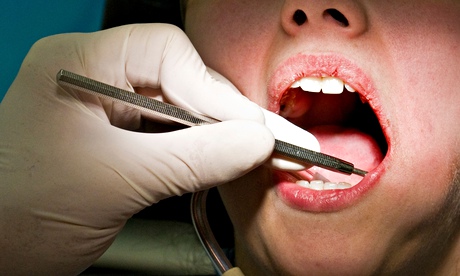
Scientists have grown rudimentary teeth out of the most unlikely of sources, human urine.
The results, published in Cell Regeneration Journal, showed that urine could be used as a source of stem cells that in turn could be grown into tiny tooth-like structures.
The team from China hopes the technique could be developed into a way of replacing lost teeth.
Other stem cell researchers caution that that goal faces many challenges.
Teams of researchers around the world are looking for ways of growing new teeth to replace those lost with age and poor dental hygiene.
Stem cells - the master cells which can grow into any type of tissue - are a popular area of research.
The group at the Guangzhou Institutes of Biomedicine and Health used urine as the starting point.
Cells which are normally passed from the body, such as those from the lining of the body's waterworks, are harvested in the laboratory. These collected cells are then coaxed into becoming stem cells.
A mix of these cells and other material from a mouse was implanted into the animals.
The researchers said that after three weeks the bundle of cells started to resemble a tooth: "The tooth-like structure contained dental pulp, dentin, enamel space and enamel organ."
However, the "teeth" were not as hard as natural teeth.
This piece of research is not immediately going to lead to new options for the dentist, but the researchers say it could lead to further studies towards "the final dream of total regeneration of human teeth for clinical therapy".
'Worst source'
Prof Chris Mason, a stem cell scientist at University College London, said urine was a poor starting point.
"It is probably one of the worst sources, there are very few cells in the first place and the efficiency of turning them into stem cells is very low.
"You just wouldn't do it in this way."
He also warned that the risk of contamination, such as through bacteria, was much higher than with other sources of cells.
Prof Mason added: "The big challenge here is the teeth have got a pulp with nerve and blood vessels which have to make sure they integrate to get permanent teeth."
http://www.bbc.co.uk/news/health-23492425No more fillings as dentists reveal new tooth decay
treatment
Scientists in London develop pain-free filling that allows teeth to repair themselves without drilling or injections

he new treatment, Electrically Accelerated and Enhanced Remineralisation (EAER), could be available within three years. Photograph: Hermes Morrison 2/Alamy
Scientists have developed a new pain-free filling that allows cavities to be repaired without drilling or injections.
The tooth-rebuilding technique developed at King's College London does away with fillings and instead encourages teeth to repair themselves.
Tooth decay is normally removed by drilling, after which the cavity is filled with a material such as amalgam or composite resin.
The new treatment, called Electrically Accelerated and Enhanced Remineralisation (EAER), accelerates the natural movement of calcium and phosphate minerals into the damaged tooth.
A two-step process first prepares the damaged area of enamel, then uses a tiny electric current to push minerals into the repair site. It could be available within three years.
Professor Nigel Pitts, from King's College London's Dental Institute, said: "The way we treat teeth today is not ideal. When we repair a tooth by putting in a filling, that tooth enters a cycle of drilling and refilling as, ultimately, each 'repair' fails.
"Not only is our device kinder to the patient and better for their teeth, but it's expected to be at least as cost-effective as current dental treatments. Along with fighting tooth decay, our device can also be used to whiten teeth."
A spinout company, Reminova, has been set up to commercialise the research. Based in Perth, Scotland, it is in the process of seeking private investment to develop EAER.
The company is the first to emerge from the King's College London Dental Innovation and Translation Centre, which was set up in January to take novel technologies and turn them into new products and practices.
King's College is a participant in MedCity, a project launched by the London mayor, Boris Johnson, to promote entrepreneurship in the London-Oxford-Cambridge life sciences "golden triangle".
The chairman of MedCity, Kit Malthouse, said: "It's brilliant to see the really creative research taking place at King's making its way out of the lab so quickly and being turned into a new device that has the potential to make a real difference to the dental health and patient experience of people with tooth decay."

This is great news :)
ReplyDelete